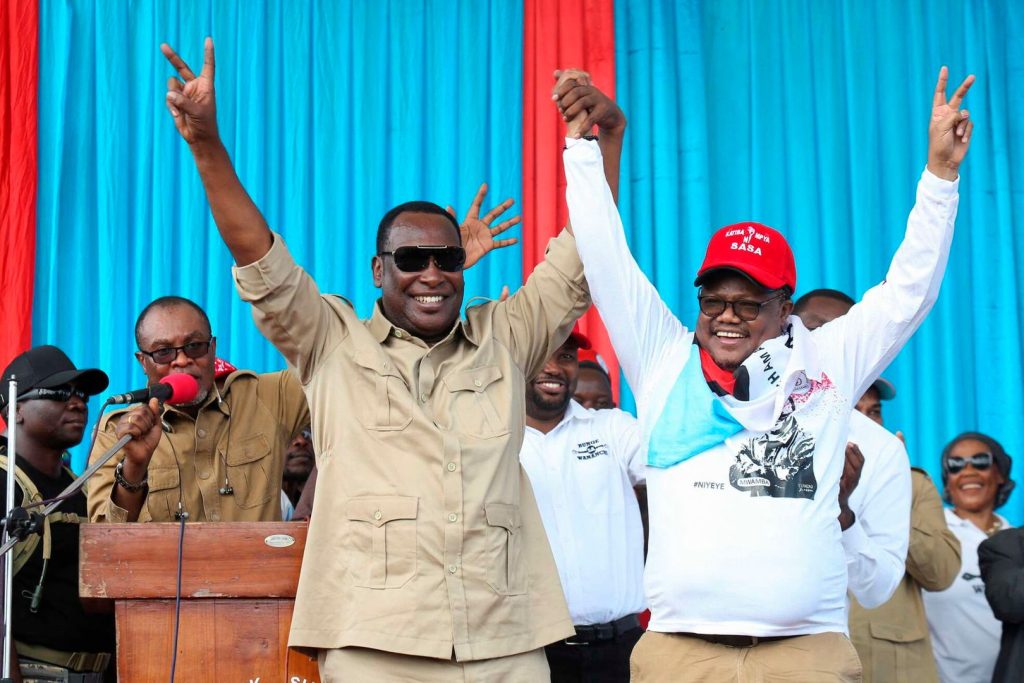In Tanzanian opposition politics lies a dilemma that could solidify or fracture the foundation of the country’s leading opposition party, Chadema.
This ideological divide pits Freeman Mbowe, a seasoned statesman advocating for preserving Chadema’s old party structure, against Tundu Lissu, a reformist championing transformation and modernity.
This tension encapsulates the age-old struggle between conservatism and reform, offering lessons for Chadema and political organizations across the continent.
Freeman Mbowe, who has been at the helm of Chadema for decades, represents the party’s traditionalist wing. His leadership emphasizes stability, institutional soft politics (clientelism), and preserving unity amidst Tanzania’s challenging political landscape.
Mbowe’s commitment to the old party structure seeks to safeguard the legacy of Chadema as a disciplined and resilient organization. In his view, abrupt reforms risk alienating loyal supporters and destabilizing the party’s internal dynamics.
For Mbowe, controlled evolution is the path forward – prioritising continuity and cohesion over rapid and uncertain change.
Yet, this conservatism comes with its challenges. Critics argue that resistance to innovation risks stagnation. Tanzania’s political climate is shifting, and opposition parties must adapt to remain relevant.
Mbowe’s approach, while providing stability, may hinder Chadema’s ability to attract younger, progressive voters who demand change. The question arises: can Chadema thrive in a fast-changing political environment while tethered to an outdated structure?
On the other side of the spectrum stands Tundu Lissu, whose vision for Chadema is rooted in reform and transformation. Lissu’s approach seeks to democratize leadership within the party, ensuring transparency and inclusivity.
His calls for modernization resonate with a younger generation of Tanzanians, eager for a progressive opposition that can effectively challenge the ruling party, CCM.
READ RELATED: Tanzania’s Future Through Tundu Lissu’s Lens: Bold Reforms for Democracy
Lissu’s emphasis on grassroots participation and policy innovation promises a Chadema that is not only reactive but proactive – a force capable of shaping Tanzania’s future.
However, Lissu’s reformist zeal is not without its pitfalls. Rapid changes risk creating divisions, particularly among those loyal to Mbowe’s leadership style.
The very reforms Lissu champions could disrupt the party’s stability, leading to power struggles and potential fragmentation.
Chadema’s challenge lies in navigating this ideological divide without losing sight of its broader mission: to provide a credible alternative to CCM’s dominance.
This internal tension between Mbowe and Lissu highlights a universal truth in political organizations – the need to balance continuity with change. While conservatism provides stability and a sense of identity, reform is essential for growth and relevance.
Chadema’s future depends on its ability to merge these seemingly opposing forces into a cohesive strategy that respects its past while embracing its potential.
A critical lesson from this dilemma is the importance of inclusive dialogue. Chadema’s leaders must foster a culture of open debate where ideological differences lead to innovation rather than division.
The party can channel its internal diversity into a strength by prioritising common goals over personal ambitions. This requires structured leadership transition plans, ensuring generational and ideological shifts occur without crises.
Moreover, Chadema can learn from the experiences of other political organizations.
For instance, Kenya’s ODM, under Raila Odinga, has struggled with similar internal reform debates, often weakening the party’s electoral prospects.
Chadema must heed such examples, recognizing that unresolved ideological conflicts can erode public trust and party unity.
Ultimately, the tension between Mbowe’s conservatism and Lissu’s reformism offers Chadema an opportunity for introspection and renewal.
Both visions hold merit – Mbowe’s stability ensures resilience, while Lissu’s reforms promise adaptability. The task before Chadema is to create a synergy that respects tradition while embracing transformation.
If managed wisely, this dilemma could become a turning point, strengthening Chadema’s position as a united and formidable opposition force.
In the grand scheme, the lesson is clear: political organizations, like societies, thrive when they balance the wisdom of experience with the energy of innovation.
For Chadema, this balance is not just a theoretical ideal but a necessity for survival and success in Tanzania’s evolving political landscape.

